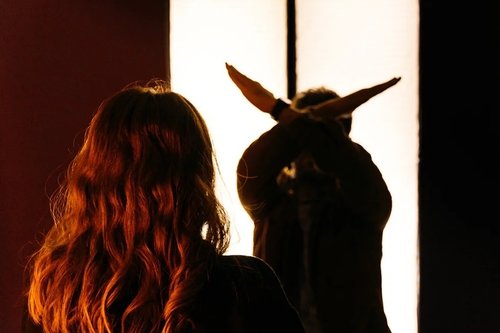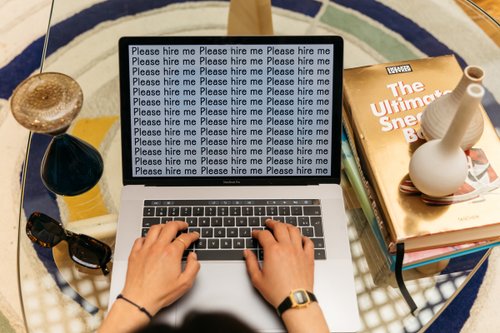Science says: Taking breaks is key when looking for a new job
Nov 21, 2022
6 mins


Journaliste chez Welcome to the Jungle
When you’re looking for work, taking breaks can help you land more job interviews, at least that’s the result of a survey co-conducted by Serge da Motta Veiga, lecturer and researcher at EDHEC, a business school in France.
It’s not easy to relax or take your foot off the gas when you’re looking for a job. Spending time on anything other than your job hunt can feel unproductive. Worse still, you can be made to feel like you’re slacking off and wasting time, especially if the people around you start to weigh in on it. Searching for a job can lead to pressure on all sides, but it should be considered for what it is: an energy-sapping, full-time role that needs you to be on top of your game. What would happen if you took time out from your job search without all that guilt that goes with it?
Why you should relax without feeling guilty
You’ve sent 10 applications and now you’re exhausted
In 1983, Ron Herbst, a 19-year-old sailor, threw a bottle into the middle of the Atlantic Ocean. In it, he left a short message and his contact details, just to see if anyone would reply. He got a response in 2016, 34 years later. While you might be more likely to receive a response to well-thought-out applications than waiting for a recruiter somewhere in the Caribbean to spot your resume gently floating along in the waves, this little anecdote can serve as a good reminder that there can often be a long drawn out silence once you’ve sent your applications. It’s not just you. Resume writing site Zety recently reported that only 10% of applications lead to a job interview, and of those interviews, only 20% lead to landing a job. These discouraging statistics are a stark reminder that looking for a job is a bit like an endurance race, and getting a place on the podium isn’t that easy. The same survey discovered that, on average, you’ll need to send 30 to 50 resumes before getting hired.
Just like training for a race, it takes a while to see the results of all your hard work. “Looking for a job can be demoralizing. It’s easy to fall into a negative spiral when you send 50 resumes and only get one or two positive responses,” observes Da Motta Veiga, a specialist in job hunting. Look at it this way: you wouldn’t think of running a marathon without passing by the energy drink stand, and you shouldn’t look for a job without taking some breaks along the way. “You can dedicate your schedule to doing just that and end up spending eight hours a day looking for a job. It can turn into a full-time job, so breaks are essential,” confirms Da Motta Veiga.
Don’t bow to peer pressure
“You have to get back on track.” “Did you call that recruiter I told you about?” “You do nothing all day!” When you’re looking for a job, pressure comes from all directions: financial, societal, and the people around you. There’s still a lot of stigma to being unemployed. How can you shake off the guilt and kick back without fanning the flames of criticism or feeling worthless? “The expectations of others are high and weigh heavily upon us,” explains our researcher. But for him, that’s all the more reason to take breaks. “Many job seekers are already under a lot of stress with strained finances and low energy levels. They need to take breaks so they don’t burn out completely.” What makes these breaks so important?
Looking for a job? You need some downtime
Productivity increases with breaks
There’s a limit to what we can achieve. Our physical and mental energy is not infinite. Looking for a job is too often seen as a period of inactivity when in reality it can be extremely tiring and stressful. Pressing the pause button can only be a good thing. “In any job or industry, one of the main things people find useful for improving their energy levels is to hit pause,” explains Da Motta Veiga. It’s a bit like finishing your working day and drawing a line through it until the next day so you can recharge your batteries. “But we shouldn’t have to wait until the end of the day to make the most of the restorative effects of a break, and that’s true for job hunting too.”
In a study that he co-wrote, analyzing the behaviors of young US graduates looking for their first job, he observed that “When job seekers manage to psychologically detach from their search every week, they feel rested and reinvigorated and end up putting in more effort and getting more interviews.” In other words, the break has a direct positive impact on their job search. It works because candidates who take time out manage to stay motivated, which in turn improves productivity and the number of interviews they get. Staying motivated is essential when looking for a job, remember, your job hunt is an endurance test, and it doesn’t always feel very rewarding.
Breaks help you to avoid silly mistakes
Not taking the time to relax, also means you risk making mistakes and wasting time because your concentration span reaches its limit. This does your job applications no good. Spelling mistakes, an incorrect email address, the wrong company stupidly left on your template, all these things can ruin your chances. Typos matter, and a staggering 59% of recruiters will reject a candidate’s resume because of a spelling mistake or poor grammar. “Job hunting is made up of many little repetitive tasks,” explains Da Motta Veiga. “A candidate has to send out their resume, over and over, fifty to a hundred times, fill in online job applications, each one similar to the next, and write cover letters, making sure they’re all tailored and personal. It’s mentally exhausting.” A break helps you to get a little perspective and unwind. The type of break you take also matters.
Are some breaks better than others?
In addition to reigniting our motivation, taking breaks has a positive influence on our ability to work and our concentration. However, for a break to have the desired positive effect, it has to meet certain criteria. The very best kind of break should be what neuroscience calls the default mode (or resting state): your unoccupied brain continues working, and this state allows for rest and renewal so it can take on more information.
Cyril Chouffe, a lead researcher at Grenoble Management School, studied the effects of this mental state on our ability to work. He asked three groups of students to carry out fairly complex management planning tasks for forty-five minutes. The first group worked continuously, while the second and third groups had a sixty-second break every fifteen minutes. The third group had to memorize a text during their break time, to prevent them from entering the default mode. He observed that the default mode improved the students’ attention span and resulted in more energy and availability. Students in the second group performed more than 10% better than the other two groups. This is why you shouldn’t spend your lunch break in front of a computer, you won’t be fully relaxed and you’ll continue to use up your limited energy supplies.
Following the two weeks of research, the students who took part in Da Motta Veiga’s study answered the following question: “What type of breaks do you take?” “The idea was that, with the help of a keyword, they explained what kind of breaks they took three to five times a day. Some thought that sending texts to their friends and family was a break. Others watched an episode of their favorite Netflix series or played video games. Others still spent an evening having dinner out with their friends. Each break is defined by the person, sometimes it’s being active or simply sleeping. What’s great about the break is that there’s no judgment as it’s up to what suits each individual.”
The students questioned in the study preferred to work in stages, and not allow themselves a break until they received a first offer or interview. “I wouldn’t necessarily prescribe a certain way of doing things, everyone needs to do what works for them and their goals. Resilience is a very personal thing. However, imagine it’s been two months and you’ve yet to land an interview: it’s tough … perhaps you could’ve been more effective and landed more interviews if you’d taken a few more breaks before getting to this point, that’s what I’d recommend.”
Don’t simply stop creating resumes and writing incredible prose for your cover letters to sit and watch Netflix or play Mario Kart. Taking a break isn’t a magic bullet: “Taking a break today won’t land you an interview tomorrow,” warns Da Motta Veiga. It’s about understanding that a few breaks can help improve your energy and restore your motivation, both essential elements to your job search. You’ll be more positive about everything you’re doing and so more likely to land interviews.
Translated by Debbie Garrick
Photo: Welcome to the Jungle
Follow Welcome to the Jungle on Facebook, LinkedIn, and Instagram, and subscribe to our newsletter to get our latest articles every day!

More inspiration: Tips for an effective job search
Enhance your job search with our expert guidance on utilizing technology, taking strategic breaks, spotting scams, and more. Get the inside scoop on what really matters when applying for a new position.

The power of reverse background checks: Why you should research potential employers
We hear a lot about the importance of researching companies before applying, but what are the benefits of doing so, and where should you start?
Feb 15, 2023

The job description tell-all: How to spot a toxic workplace before you apply
Decoding a job description is like getting a behind-the-scenes look at the workings of a company; the good, the bad, and the ugly.
Jan 23, 2023

Peeling back the curtain on the hidden job market
Most job hunters rely on publicly-posted job ads to find their next role, but is there a secret, underground shortcut they're missing out on?
Jan 19, 2023

Job hunters beware: How to spot a recruitment scam
Job advertisements are hotbeds for recruitment scams, so how are you supposed to know what's real and not?
Oct 17, 2022

How to apply for a job without seeming desperate
There can be a fine line between a company loving your approach and them starting to feel hounded. So how can you find the middle ground?
May 04, 2022
The newsletter that does the job
Want to keep up with the latest articles? Twice a week you can receive stories, jobs, and tips in your inbox.

Looking for your next job?
Over 200,000 people have found a job with Welcome to the Jungle.
Explore jobs